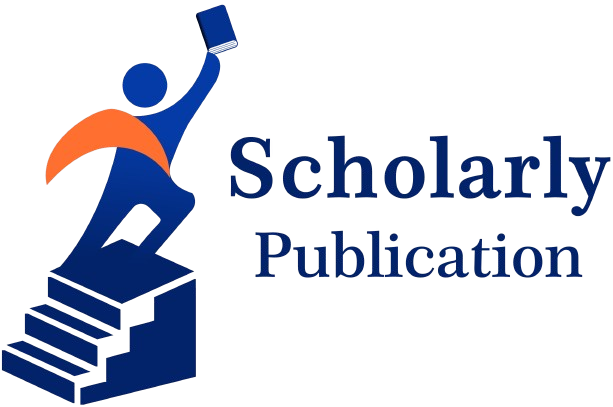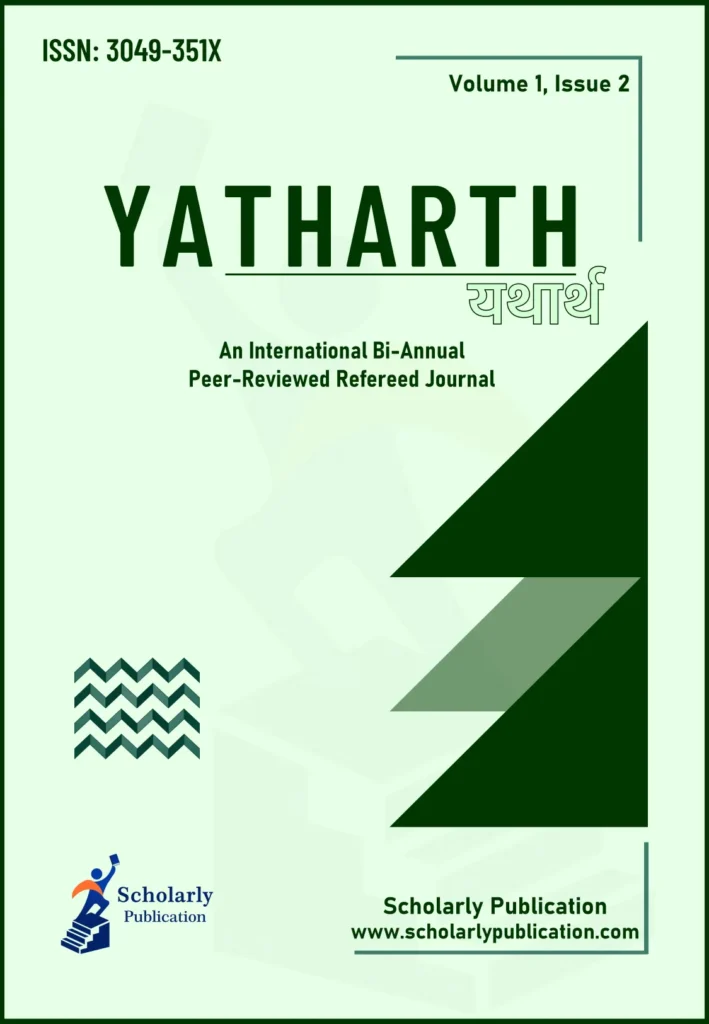Exploring the Role of AI Tools in Shaping Learning Experiences in the Metaverse: A Student-Centric Analysis
Volume 1, Issue 2, Article Number: 252002 (2025)
Home >> Yatharth >> Volume 1, Issue 2
1Research Scholar, Faculty of Commerce and Business Studies, Motherhood University, Roorkee – 247661 (India)
2Research Supervisor, Dean and Professor, Faculty of Commerce and Business Studies, Motherhood University, Roorkee – 247661 (India)
3Co-Supervisor, Director and Professor, Hindustan Institute of Management and Computer Studies, Mathura – 281122 (India)
*Corresponding Author: tanumarwah@gmail.com
Received: 07 August 2025 | Revised: 25 August 2025
Accepted: 26 August 2025 | Published Online: 03 September 2025
DOI: https://doi.org/10.5281/zenodo.17038859
© 2025 The Authors, under a Creative Commons license, Published by Scholarly Publication
Abstract
The paper investigates the complex relationship between students’ engagement with artificial intelligence (AI) tools and their readiness for future educational environments, particularly the Metaverse. The study employs a descriptive and exploratory quantitative design, collecting data through a questionnaire from a sample of 200 college students across various disciplines in the Delhi/NCR region of India. The primary objectives were to analyze AI tool usage patterns, assess the level of student trust in these technologies, examine the perceived impact of AI on academic grades, and determine if current AI adoption behaviors reflect a preparedness for more immersive, Metaverse-style education.
The findings challenge several common assumptions about technology adoption in education. A key result is the absence of a statistically significant correlation between the frequency of daily AI tool usage and the degree of trust students place in the technology. The correlation coefficient was found to be a negligible 0.050, indicating that mere exposure or increased usage does not automatically foster greater trust. Even more significant is the finding that a student’s trust in AI tools does not serve as a meaningful predictor of their academic grades. A linear regression analysis confirmed that the model was not statistically significant (p-value = 0.3225), with trust in AI explaining less than 1% of the variability in grades. This suggests that other factors, such as individual study habits or instructional quality, play a far more substantial role in academic outcomes.
The study also provides valuable descriptive data on current student behavior. It found that students, on average, use AI tools for approximately 2.47 hours per day. However, a high standard deviation indicates a wide spectrum of engagement, from minimal to heavy usage, suggesting that AI has not been uniformly integrated into student life. Among the AI tools mentioned, Gemini was identified as the most preferred, while ChatGPT was the least preferred.
Perhaps the most critical conclusion for the future of educational technology is that students’ readiness for immersive learning environments like the Metaverse is not driven by a simple increase in exposure or trust. Instead, their willingness to adopt new technologies is largely dependent on the perceived usefulness of the tools. These findings carry significant implications for educators and policy-makers, suggesting that the successful implementation of the Metaverse in education will require a strategic focus on demonstrating clear, practical benefits for learning. The study advocates for a phased, non-uniform implementation approach that addresses diverse student needs and emphasizes the crucial role of educator training and robust technological infrastructure.
Keywords
AI tools, Metaverse, Educational technology, Student trust, Academic performance
References
Benhamou, S., Janin, L., Bocognano, A., Charrié, J., & Thibault, G. (2018). Artificial intelligence and work. Paris: France Stratégie, 90.
Chen, X., Zou, D., Xie, H., & Wang, F. L. (2023). Metaverse in education: Contributors, cooperations, and research themes. IEEE Transactions on Learning Technologies, 16, 1111–1129.
[View Article] [Google Scholar]
Flores-Castañeda, R. O., Olaya-Cotera, S., & Iparraguirre-Villanueva, O. (2024). Benefits of metaverse application in education: A systematic review. International Journal of Engineering Pedagogy (iJEP), 14, 88–104.
[View Article] [Google Scholar]
Grájeda, A., Burgos, J., Córdova, P., & Sanjinés, A. (2024). Assessing student-perceived impact of using artificial intelligence tools: Construction of a synthetic index of application in higher education. Cogent Education, 11, 2287917.
[View Article] [Google Scholar]
Kaddoura, S., & Al Husseiny, A. (2023). The rising trend of metaverse in education: Challenges, opportunities, and ethical considerations. PeerJ Computer Science, 9, e1252.
[View Article] [Google Scholar]
Kathala, K. C. R., & Palakurthi, S. (2024). AI literacy framework and strategies for implementation in developing nations. In Proceedings of the 2024 16th International Conference on Education Technology and Computers (ICETC), 418–422.
[View Article] [Google Scholar]
Koohang, A., Sargent, C. S., & Svanadze, S. (2024). Students’ perceptions of benefits and opportunities of artificial intelligence (AI). Issues in Information Systems, 25, 438–450.
[View Article] [Google Scholar]
Lin, H., Wan, S., Gan, W., Chen, J., & Chao, H. (2022). Metaverse in education: Vision, opportunities, and challenges. In 2022 IEEE International Conference on Big Data (Big Data), Osaka, Japan, 2857-2866.
[View Article] [Google Scholar]
Mirdad, K., Daeli, O. P. M., Septiani, N., Ekawati, A., & Rusilowati, U. (2024). Optimizing student engagement and performance using AI-enabled educational tools. Journal of Computer Science and Technology Application, 1, 53–60.
[View Article] [Google Scholar]
Mumtaz, S., Carmichael, J., Weiss, M., & Nimon-Peters, A. (2025). Ethical use of artificial intelligence-based tools in higher education: Are future business leaders ready? Education and Information Technologies, 30, 7293–7319.
[View Article] [Google Scholar]
Sarıtaş, M. T., & Topraklıkoğlu, K. (2022). Systematic literature review on the use of metaverse in education. International Journal of Technology in Education, 5, 586–607.
[View Article] [Google Scholar]
Strzelecki, A. (2025). ChatGPT in higher education: Investigating bachelor and master students’ expectations towards AI tool. Education and Information Technologies, 30, 10231–10255.
[View Article] [Google Scholar]
Svoboda, P., & Knihová, L. (2025). Exploring the Future of Education: Integrating Metaverse and AI Tools to Enhance Learning Experiences. TEM Journal, 14, 631–643.
[View Article] [Google Scholar]
Tlili, A., Huang, R., Shehata, B., Liu, D., Zhao, J., Metwally, A. H. S., Wang, H., Denden, M., Bozkurt, A., Lee, L.-H., Beyoglu, D., Altinay, F., Sharma, R. C., Altinay, Z., Li, Z., Liu, J., Ahmad, F., Hu, Y., Salha, S., Abed, M., & Burgos, D. (2022). Is metaverse in education a blessing or a curse: A combined content and bibliometric analysis. Smart Learning Environments, 9, 24.
[View Article] [Google Scholar]
Verma, M. K. (2018). Artificial intelligence and its scope in different areas with special reference to the field of education. International Journal of Advanced Educational Research, 3, 5–10.
von Garrel, J., & Mayer, J. (2023). Artificial intelligence in studies—Use of ChatGPT and AI-based tools among students in Germany. Humanities and Social Sciences Communications, 10, 799.
[View Article] [Google Scholar]
Ward, B., Bhati, D., Neha, F., & Guercio, A. (2025). Analyzing the impact of AI tools on student study habits and academic performance. In 2025 IEEE 15th Annual Computing and Communication Workshop and Conference (CCWC), 00434-00440.
[View Article] [Google Scholar]
Younas, M., Ali, S., Mahmood, T., Nasimi, R. A., Ashraf, M. K., & Akter, S. (2024). Students’ awareness and perception regarding the usage of AI in education at Government College University, Faisalabad. Journal of Social Sciences Advancement, 5, 81–85.
Cite This Article
T. Marwah, P. K. Agarwal, and N. Gupta, “Exploring the Role of AI Tools in Shaping Learning Experiences in the Metaverse: A Student-Centric Analysis,” Yatharth 1(2) (2025) 251002. https://doi.org/10.5281/zenodo.17038859
Rights & Permission
This is an open access article published under the Creative Commons Attribution (CC BY) International License, which allows unrestricted use, distribution, and reproduction in any medium, provided the original work is properly cited. No permission is needed to reuse this content under the terms of the license.
For uses not covered above, please contact the Scholarly Publication Rights Department.

